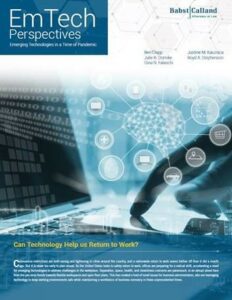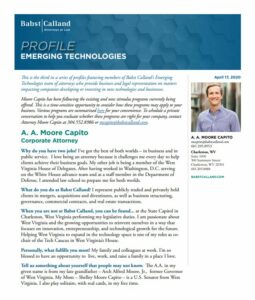 Business owners faced with extraordinary operational and financial challenges caused by the COVID-19 pandemic may also be managing special demands and concerns posed by their owners. There is never a good time for an internal ownership squabble to bubble up to the surface, but owner conflicts or differences can be particularly troublesome when the business is already under duress.
Business owners faced with extraordinary operational and financial challenges caused by the COVID-19 pandemic may also be managing special demands and concerns posed by their owners. There is never a good time for an internal ownership squabble to bubble up to the surface, but owner conflicts or differences can be particularly troublesome when the business is already under duress.
Disruption Can Create Conflict
There is no question that the pandemic has impacted many businesses’ finances and strategy, as well as relationships between co-owners. The warning signs of an owner disagreement should never be ignored. If left unchecked, these misunderstandings can cause real damage to a company’s health and vitality including negative impacts on the bottom line, employee morale, and even relationships with creditors, customers and suppliers. A company can be particularly vulnerable at critical moments when its owners may already be dealing with the pandemic ramifications or other financial and operational challenges. Do not wait for the perfect time to deal with owner disagreements because that time will never come. The stability of a company’s day-to-day operations and future financial success are often dependent upon resolution of these multi-faceted disagreements between owners.
Read More.
 When the economy started shutting down in March as a result of COVID-19 and employees began working remotely, keeping intellectual property and proprietary information safe didn’t top the list of companies’ concerns.
When the economy started shutting down in March as a result of COVID-19 and employees began working remotely, keeping intellectual property and proprietary information safe didn’t top the list of companies’ concerns.
“Some businesses didn’t put procedures in place or have appropriate training classes because no one really thought the pandemic would extend as long as it has,” says Carl Ronald, shareholder at Babst Calland. “They didn’t instruct employees on how to identify important confidential information or safeguard certain proprietary documents when working from home.”
Smart Business spoke with Ronald about how to keep your company’s proprietary information safe when employees are working outside the office. Read more.
Not only has the global pandemic spawned a race to develop a cure for COVID-19, it has also created a race to the Patent Office to protect the massive investments companies are making in their attempts to develop novel diagnostics, therapies, and vaccines to combat the disease. In the United States, the first inventor to file a patent application that teaches a new and non-obvious way to treat the virus or its effects will be eligible for the limited monopoly that a patent provides. As has been reported, researchers are employing a variety of different mechanisms to attack the virus and it is expected that a significant number of patents will ultimately issue from these efforts.
 While Big Pharma is well-poised to incur the expense of patent filing, including the additional expense of paying for accelerated examination of their applications, smaller concerns may not be in a position to do so. To help small businesses and solo inventors in this regard, the United States Patent Office has announced a program that would fast-track the examination of certain patent applications related to the pandemic. While the typical turn-around time for an Examiner to provide an initial review of a new application is about two years after filing, payment of an extra fee to accelerate examination is also an option. Small businesses and startup companies, however, typically can’t take advantage of this program due to the substantial increased initial cost. To remove this impediment, the new program enables business with less than 500 employees to request accelerated examination of certain COVID-19-related applications with no additional upfront payment. If an application qualifies for the program, the Patent Office promises to fully examine it within a year of being granted prioritized status.
While Big Pharma is well-poised to incur the expense of patent filing, including the additional expense of paying for accelerated examination of their applications, smaller concerns may not be in a position to do so. To help small businesses and solo inventors in this regard, the United States Patent Office has announced a program that would fast-track the examination of certain patent applications related to the pandemic. While the typical turn-around time for an Examiner to provide an initial review of a new application is about two years after filing, payment of an extra fee to accelerate examination is also an option. Small businesses and startup companies, however, typically can’t take advantage of this program due to the substantial increased initial cost. To remove this impediment, the new program enables business with less than 500 employees to request accelerated examination of certain COVID-19-related applications with no additional upfront payment. If an application qualifies for the program, the Patent Office promises to fully examine it within a year of being granted prioritized status.
The program is further limited to therapeutics, vaccines and diagnostic tests that are subject to FDA approval for COVID-19 related uses. FDA approvals include, for example, Investigational New Drug (IND) applications, Investigational Device Exemptions (IDE), New Drug Applications (NDA), Biologics License Applications (BLA), Pre-market Approvals (PMA), and Emergency Use Authorizations (EUA).
As of Thursday, August 20th, there have been 274 applicants with 146 requests having been granted. The program is limited to the first 500 approved applicants.
 Can Technology Help Us Return to Work?
Can Technology Help Us Return to Work?
Coronavirus restrictions are both easing and tightening in cities around the country, and a nationwide return to work seems further off than it did a month ago. But it is never too early to plan ahead. As the United States looks to safely return to work, offices are preparing for a radical shift, accelerating a need for emerging technologies to address challenges in the workplace. Separation, space, health, and cleanliness concerns are paramount, in an abrupt about-face from the pre-virus trends towards flexible workspaces and open floor plans. This has created a host of novel issues for business administrators, who are leveraging technology to keep work environments safe while maintaining a semblance of business normalcy in these unprecedented times.
Read More.
 Regulatory Challenges to Fully Utilizing Existing Technology
Regulatory Challenges to Fully Utilizing Existing Technology
On May 1st, Amazon Prime premiered Upload, the story of a software engineer whose consciousness is transferred to the cloud after his fully autonomous vehicle (AV) rear-ends another car. The accident takes place in 2033. By then, the show imagines, vehicles that drive themselves will be the default. We won’t spoil the ending. But, in the fictional 2033 only 13 years from now—the public is astounded when the vehicle is involved in a wreck. It is an entertaining take on the future. In reality, however, we’ve got a lot of regulations to update if autonomous vehicles (AVs) are going to play the role imagined in Upload.
Read More.
Tags: Autonomous Vehicles,
Coronavirus,
COVID-19,
Drones,
Efficiency,
Emerging Technology,
Industry News,
Innovation,
Mobility,
Pandemic,
Robotics,
Tech Industry,
Technology,
Transportation

Opportunities: Leveraging Technology to Meet New Demands
Most of the world is staying home, but businesses must still pay their bills. In late April the federal government estimated the U.S. economy contracted by 4.8 percent in the first quarter of 2020, mostly due to the Coronavirus pandemic. Because the real economic consequences of social distancing occurred in April, future numbers will likely be as bleak, if not worse.
Yet, some businesses are taking bold steps, innovating in communications with their customers, and leveraging pre-existing tools to retool how their customers interact with the company and its product. Companies that never before offered delivery are experimenting with last mile logistics. Farms whose regular restaurant or hotel customers are closed due to public health orders are retooling their supply chains to supply local households. And companies that previously relied on face-to-face interactions are turning to virtual solutions to bring their product to market, even in a field like wine production—where taste is an essential part of the purchasing decision. These companies described here provide just a few examples of how creatively leveraging existing technologies can allow a company to maintain operations.
Read More.
Tags: Commercial,
Coronavirus,
Corporate Law,
COVID-19,
Drones,
Efficiency,
Emerging,
Emerging Technology,
Industry News,
Innovation,
Last Mile Logistics,
Logistics,
Mobility,
Pandemic,
Regulations,
Regulatory,
Remote Learning,
Robotics,
Robots,
Supply Chain,
Tech Industry,
Technology,
Transportation,
US DOT

The COVID-19 crisis has revealed numerous legal issues that entrepreneurs and business leaders hadn’t faced before. Christian Farmakis, chairman of Babst Calland explains what c-suite executives should be thinking about, including giving a new level of scrutiny to contracts.
Click here to listen.
 This is the third in a series of profiles featuring members of Babst Calland’s Emerging Technologies team of attorneys who provide business and legal representation on matters impacting companies developing or investing in new technologies and businesses.
This is the third in a series of profiles featuring members of Babst Calland’s Emerging Technologies team of attorneys who provide business and legal representation on matters impacting companies developing or investing in new technologies and businesses.
Moore Capito has been following the existing and new stimulus programs currently being offered. This is a time-sensitive opportunity to consider how these programs may apply to your business. Various programs are summarized here for your convenience. To schedule a private conversation to help you evaluate whether these programs are right for your company, contact Attorney Moore Capito at 304.552.8986 or mcapito@babstcalland.com.
Read More.
 Business owners faced with extraordinary operational and financial challenges caused by the COVID-19 pandemic may also be managing special demands and concerns posed by their owners. There is never a good time for an internal ownership squabble to bubble up to the surface, but owner conflicts or differences can be particularly troublesome when the business is already under duress.
Business owners faced with extraordinary operational and financial challenges caused by the COVID-19 pandemic may also be managing special demands and concerns posed by their owners. There is never a good time for an internal ownership squabble to bubble up to the surface, but owner conflicts or differences can be particularly troublesome when the business is already under duress. When the economy started shutting down in March as a result of COVID-19 and employees began working remotely, keeping intellectual property and proprietary information safe didn’t top the list of companies’ concerns.
When the economy started shutting down in March as a result of COVID-19 and employees began working remotely, keeping intellectual property and proprietary information safe didn’t top the list of companies’ concerns. While Big Pharma is well-poised to incur the expense of patent filing, including the additional expense of paying for accelerated examination of their applications, smaller concerns may not be in a position to do so. To help small businesses and solo inventors in this regard, the United States Patent Office has announced a
While Big Pharma is well-poised to incur the expense of patent filing, including the additional expense of paying for accelerated examination of their applications, smaller concerns may not be in a position to do so. To help small businesses and solo inventors in this regard, the United States Patent Office has announced a 


